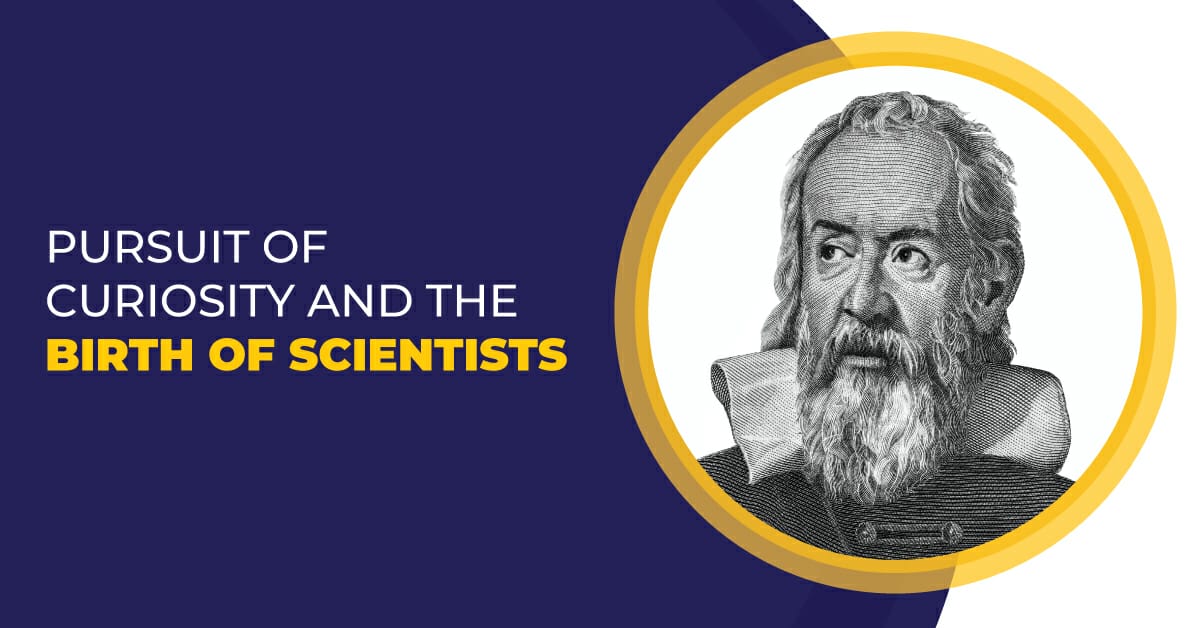PURSUIT OF CURIOSITY AND THE BIRTH OF SCIENTISTS
 Posted On
Posted On
524 total views, 1 views today
“Curiosity will conquer fear even more than Bravery will”
: James Stephens
From time immemorial, man is curious about nature and natural phenomenon. His curiosity has driven to know the unknown, to explore the unexplored, to envision the unseen and to seek answer for the vastly rhetorical ones. This pursuit of curiosity in him had led to unfold the “findings “ which have altered the face of the World forever. Had there not been the quest for the unknown, the world would have been deprived of bearing the philosophers, thinkers, rationalists, scientists and other immortal legends. Curiosity inbuilds the quest for a philosophical outlook , which in turn gives birth to researches. Our Mother Earth , has bore some remarkable thinkers , since her inception , who have laid down the path for modern science to fathom in.
In Ancient world, classical philosophy went along with development of science and researches. As such most of the philosophers were in turn the scientists and their “pursuit of rational thinking” unfolded their “quest of unexplored“. They envisioned the human existence and the relationship with nature through their intellectual eyes. Ancient Greek scientists and philosophers were the first in the West. Thales, Pythagoras, Euclid, Archimedes, to name just a few. Not only astrology and alchemy were the dubious fruits of curiosity , but also Mathematics derived its form to this nature of curios questioning. Francis Bacon is often referred as a very important figure in the development of modern science. In the story for “curiosity” , he mentioned how to refine our relationship with it and knowledge from turning toxic.
However, curiosity is the cornerstones of science. Scientists are curious explorers. They are inquisitive about the things like elements, life, environments, galaxies- that shape our world and the universe. They apply their wandering brain queerness to discover new things about the topics that interests them. They try to look for the answers of their unending questions through observation and investigation. Scientists are hungry to learn and eager to contribute in whichever ways they can. The world would undeniably a different and a dull place, had it not been for the discoveries and innovations made by the great scientists.
Following are the world famous scientists who have imparted significantly to the world with their incessant curiosity.
ALBERT EINSTEIN: One of the well-known and most recognized scientist to have had graced the world with his intelligent mind. Einstein was born to a Jewish family in 1879. From a very young age he indicated great proficiency in the field of mathematics and science due to his curious and logical brain. His many great achievements included developing special and general theories of relativity and a Nobel Prize for Physics for his explanation of the photoelectric effect. His other influential models consisted, the deflection of light by gravity, the quantum theory of atomic motion in solids, Brownian motion and much more. Einstein famously said, “I have no special talents. I am only passionately curious.”
SIR ISAAC NEWTON : Sitting under a tree, Newton noticed that an apple fell downwards and not upwards. This interesting encounter lead to one of the greatest discovery in the history- Gravitation. Born and brought up in in England, Newton had several other inventions to his name. He published a book called “Philosophae Naturalis Principia Mathematica” which highlights his theories of gravitation and the three laws of motion. All of these principles are fundamental to the way in which we understand the world now. One of his famous quotes include, “What we know is a drop, what we don’t know is an ocean”
GALILEO GALILEE: Born in Italy in 1564, Galileo is considered the father of modern science and made major contributions to the fields of physics, astronomy, cosmology, mathematics and philosophy. He was acknowledged for his ground breaking and debatable opinions on geocentric model. His various other inventions comprised of telescopes, a compass and a thermometer. With these telescopes he also identified four of Jupiter’s satellites. Galileo legendarily opined –“You cannot teach a man anything, you can only help him find it within himself.”
CHARLES DARWIN : Counter-intuition was his specialty. The Father of Evolution, Darwin was extremely curious about nature, even when he was a child. He used to collect all kinds of rocks, leaves, insects and this deep intellect quest in him went on to develop his “Golden Rule” and his path-breaking work, “The origin of Species”. No doubt, he has been mentioned by Peter Brent as “A Man Of Enlarged Curiosity”.
CV RAMAN : Born in Trichy, India, CV Raman is one of the great scientists from India. He was the first Asian and non-White person to win a Nobel Prize in the sciences. His most famous work comes in the topic of scattering of light. He also worked on the acoustics of musical instruments. He was one of the first people to explore the harmonic nature of the sound of the Indian drums such as the tabla and the mridangam.
CV Raman discovered that, when light crosses a transparent material, some of the deflected light changes in wavelength. This phenomenon is now called the Raman scattering and is the result of the Raman Effect. He stated, “Ask the right questions, and Nature will open the doors to her secrets.”
And with Sir Raman, our Motherland boasts of her other children of extreme curiosity, whose curious inventions have led to discovery of Crescograph to measure plants’ responses by none other than Jagadish Chandra Bose, Boson’s Particles by Satyaendranath Bose, the curios Mathematician Ramanujan, and the list will practically go endless from the time of Aryabhatta till date.
Thus Curiosity is deep within our minds. From the time Man breathes life onto the Mother Earth, till he closes his eyes, he goes on questioning the unquestioned. This zest for inquisitiveness has given birth to all the explorations, innovations and excavations of the unfathomed and unfamiliar world. Modern science is a child of such pursuit and it will go on till infinity. After all to quote Fischer at the end , “All the world is a laboratory to the inquiring mind”.



